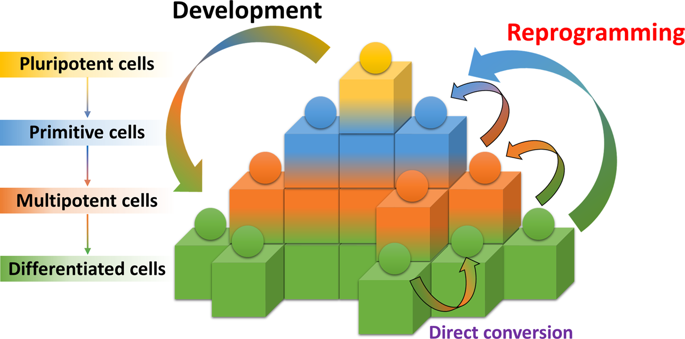当前位置:
X-MOL 学术
›
Exp. Mol. Med.
›
论文详情
Our official English website, www.x-mol.net, welcomes your
feedback! (Note: you will need to create a separate account there.)
Small-molecule-mediated reprogramming: a silver lining for regenerative medicine.
Experimental & Molecular Medicine ( IF 9.5 ) Pub Date : 2020-02-20 , DOI: 10.1038/s12276-020-0383-3 Yohan Kim 1, 2 , Jaemin Jeong 1, 2 , Dongho Choi 1, 2
Experimental & Molecular Medicine ( IF 9.5 ) Pub Date : 2020-02-20 , DOI: 10.1038/s12276-020-0383-3 Yohan Kim 1, 2 , Jaemin Jeong 1, 2 , Dongho Choi 1, 2
Affiliation

|
Techniques for reprogramming somatic cells create new opportunities for drug screening, disease modeling, artificial organ development, and cell therapy. The development of reprogramming techniques has grown exponentially since the discovery of induced pluripotent stem cells (iPSCs) by the transduction of four factors (OCT3/4, SOX2, c-MYC, and KLF4) in mouse embryonic fibroblasts. Initial studies on iPSCs led to direct-conversion techniques using transcription factors expressed mainly in target cells. However, reprogramming transcription factors with a virus risks integrating viral DNA and can be complicated by oncogenes. To address these problems, many researchers are developing reprogramming methods that use clinically applicable small molecules and growth factors. This review summarizes research trends in reprogramming cells using small molecules and growth factors, including their modes of action.
中文翻译:

小分子介导的重编程:再生医学的一线希望。
重编程体细胞的技术为药物筛选,疾病建模,人工器官发育和细胞疗法创造了新的机会。自通过转导小鼠胚胎成纤维细胞中的四个因子(OCT3 / 4,SOX2,c-MYC和KLF4)诱导多能干细胞(iPSC)以来,重编程技术的发展呈指数增长。对iPSC的初步研究导致直接转化技术使用了主要在靶细胞中表达的转录因子。但是,用病毒对转录因子进行重编程有整合病毒DNA的风险,并且癌基因会使其复杂化。为了解决这些问题,许多研究人员正在开发使用临床上适用的小分子和生长因子的重编程方法。
更新日期:2020-02-20
中文翻译:

小分子介导的重编程:再生医学的一线希望。
重编程体细胞的技术为药物筛选,疾病建模,人工器官发育和细胞疗法创造了新的机会。自通过转导小鼠胚胎成纤维细胞中的四个因子(OCT3 / 4,SOX2,c-MYC和KLF4)诱导多能干细胞(iPSC)以来,重编程技术的发展呈指数增长。对iPSC的初步研究导致直接转化技术使用了主要在靶细胞中表达的转录因子。但是,用病毒对转录因子进行重编程有整合病毒DNA的风险,并且癌基因会使其复杂化。为了解决这些问题,许多研究人员正在开发使用临床上适用的小分子和生长因子的重编程方法。











































 京公网安备 11010802027423号
京公网安备 11010802027423号